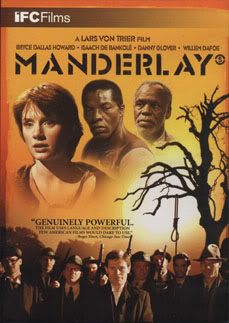|
The Film

Manderlay is Lars von Trier's sequel to Dogville (2003). It is a film that tackles the twin issues of slavery and democracy. Set in the 1930s and shot in minimalist dogme style, von Trier does what he does best, attempting to strip away the superfluous eye candy that surrounds most modern cinema so as to discover the heart of these issues. With Manderlay I believe he has succeeded with his task - crafting a film that brings insight to both the past and the present. For those of you who are high-flying idealists, get ready to come crashing down. For those of you who are salt-of-the-earth realists, get ready to look smug and feel self-satisfied.
The film begins with Grace Margaret Mulligan (Bryce Dallas Howard), her gangster father (Willem Dafoe) and their escort travelling through Alabama, where they encounter the Manderlay plantation and quickly make the discovery that this small corner of the American south has continued to keep African slaves 70 years after slavery has been abolished. In a fit or righteous anger Grace and her goons free the slaves, however she soon discovers that emancipation is not the social panacea she thought it was and that some bonds are not so easily broken. These ideas are personified in two former slaves, Wilhelm (Danny Glover) who is terrified that these former slaves will be completely unable to assimilate into modern American culture, and Timothy (Issach De Bankole) who seems to carry with him all the pride and rage of an entire kidnapped civilisation.
I am not, at heart, a huge fan of the dogme style of cinema. I find its stark atmosphere makes it difficult to concentrate on, and that it is hard for such films to maintain tension in the narrative when the lack of set and sound constantly reminds us of the unrealistic nature of the film. I am therefore overjoyed to say that I experienced none of these issues so far as Manderlay is concerned. The acting was superb - Grace, Wilhelm, and Timothy were all essentially allegorical characters and yet they were each well fleshed-out and I found myself empathising with all of them. The Narrator (John Hurt) was simply a joy to listen to. He has one of those rich, emotive voices that I could just lie back and listen to for hours. Generally, by focusing on the narrator to look into the deeper aspects of ideals, a film can quickly shift from a story to a lecture. That was not the case here; indeed Hurt brought a great deal of humour to the role. One line in particular will stick with me for a while to come, on the subject of voting: Ballots could be unrivalled, but determining the time by public debate was rarely feasible. That was quite apparent.
Most unfortunately for me, the television on which I watched this film was not NTSC capable, so I ended up watching it in black and white. About half way through, though, the poetic nature of watching a film about slavery in black and white dawned on me, and I urge anyone who watches this film to give it a once over with the colour turned right down, just so you can see what I'm talking about.
Ultimately Manderlay shows us how the shackles of slavery are not so easily cast away after its abolishment from the legal code. It shows us how the scars it leaves on individuals and communities echo down through the generations. But this film is as much a scathing look at America's own chequered past as it is an attack on America's current foreign policy; and how the bringing of democracy cannot be a subject of blinkered idealism - it must be done with the greatest degree of practicality. Lars von Trier's views on the subject are quite apparent and, like both his characters and his sets, he strips away the layers protecting our highest liberal ideals; he sets them in opposition to long-discarded conservative paradigms to show us that the deeper truths lie somewhere in between.
Video
Presented in a widescreen ratio of 2.35;1 this anamorphic transfer is beautifully sharp, a lot of the image is very dark considering the stripped down setting, the blacks felt true and with an appropriate depth. Colors are also stripped down and very muted but are rendered well. Considering this film was shot in a digital format it appears as though this transfer was created from the final digital source. I could not see any major flaws.
Audio
This film includes only one audio track, an English Dolby Digital 5.1 surround track, and much like the overall look of the film the track is minimalist, Dialogue as expected is clean and distortion free. The surround channels are put to use effectively when required giving the film some depth, but a true immersion is not what von Trier would have wanted anyway and thus this track reflects the filmmakers vision.
Optional subtitles are also included in English for the hearing impaired and Spanish.
Extras
Genius Products have sadly released this film without any extras, considering the Danish release is a 2-disc set with a plethora of supplementary material this has come as quite a disappointment.
Overall
| The Film: B+ |
Video: A |
Audio: A |
Extras: F |
Overall: C |
|


